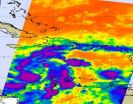(Press-News.org) The Atlantic Ocean circulation (termed meridional overturning circulation, MOC) is an important component of the climate system. Warm currents, such as the Gulf Stream, transport energy from the tropics to the subpolar North Atlantic and influence regional weather and climate patterns. Once they arrive in the North the currents cool, their waters sink and with them they transfer carbon from the atmosphere to the abyss. These processes are important for climate but the way the Atlantic MOC responds to climate change is not well known yet.
An international team of investigators under the leadership of two researchers from the UAB now demonstrates the response of the Atlantic MOC to climate change in the past. The new research results will be published on 4 November 2010 in the international front-line journal NATURE. The research project was led by Rainer Zahn (ICREA researcher) and Pere Masque, both of the UAB at the Institut de Ciència i Tecnologia Ambientals (ICTA) and Department of Physics. With collaborators at the universities of Seville, Oxford and Cardiff (UK) they investigated the distribution of isotopes in the Atlantic Ocean that are generated from the natural decay of uranium in seawater and are distributed with the flow of deep waters across the Atlantic basin. The young investigator Cesar Negre studied the natural abundance of these isotopes in the seafloor sediments 2.5 km deep in the South Atlantic and achieved a PhD degree in the Environmental Science and Technology doctoral programme at ICTA.
The study shows that the ocean circulation was very different in the past and that there was a period when the flow of deep waters in the Atlantic was reversed. This happened when the climate of the North Atlantic region was substantially colder and deep convection was weakened. At that time the balance of seawater density between the North and South Atlantic was shifted in such a way that deep water convection was stronger in the South Polar Ocean. Recent computer models simulate a reversal of the deep Atlantic circulation under such conditions while it is only now with the new data generated by UAB scientists and their colleagues from Seville and the UK that the details of the circulation reversal become apparent. This situation occurred during the ice age 20,000 years ago. Although this was far back in time the results are relevant for our climate today and in the near future. The new study shows that the Atlantic MOC in the past was very sensitive to changes in the salt balance of Atlantic Ocean currents. Similar changes in seawater salt concentration are expected to occur in the North Atlantic in the course of climate warming over the next 100 years. Therefore the data to be published in Nature offer the climate modelling community the opportunity to calibrate their models and improve their capacity to predict reliably future ocean and climate changes.
INFORMATION:
The research has been funded by the Spanish Ministry for Science and Innovation (MICINN).
Earth's climate change 20,000 years ago reversed the circulation of the Atlantic Ocean
Global warming today could have similar effects on ocean currents and could accelerate climate change
2010-11-04
ELSE PRESS RELEASES FROM THIS DATE:
Psyllid identification key to area-wide control of citrus greening spread
2010-11-04
At least six psyllid species have been found in the citrus-growing areas of the Rio Grande Valley of Texas, according to a U.S. Department of Agriculture (USDA) scientist who is working to control the spread of the psyllid-transmitted citrus greening disease.
A few years ago, citrus growers in south Texas noticed a new insect, the Asian citrus psyllid, on their citrus trees. This was a cause for concern, because this tiny pest is responsible for transmitting citrus greening, also known as Huanglongbing (HLB). The disease was first detected in Florida in 2005 and now ...
Main squeeze not needed for boa mom
2010-11-04
In a finding that upends decades of scientific theory on reptile reproduction, researchers at North Carolina State University have discovered that female boa constrictors can squeeze out babies without mating.
More strikingly, the finding shows that the babies produced from this asexual reproduction have attributes previously believed to be impossible.
Large litters of all-female babies produced by the "super mom" boa constrictor show absolutely no male influence – no genetic fingerprint that a male was involved in the reproductive process. All the female babies ...
UGA study finds moving animals not a panacea for habitat loss
2010-11-04
Athens, Ga. – New University of Georgia research suggests moving threatened animals to protected habitats may not always be an effective conservation technique if the breeding patterns of the species are influenced by a social hierarchy.
Research, published in the early online edition of the journal Biological Conservation, found an initial group of gopher tortoises released on St. Catherine's Island, Ga. were three times more likely to produce offspring than a later-introduced group, although the initial group had a much smaller proportion of reproduction-aged males.
"There ...
Most river flows across the US are altered by land and water management
2010-11-04
The amount of water flowing in streams and rivers has been significantly altered in nearly 90 percent of waters that were assessed in a new nationwide USGS study. Flow alterations are a primary contributor to degraded river ecosystems and loss of native species.
"This USGS assessment provides the most geographically extensive analysis to date of stream flow alteration," said Bill Werkheiser, USGS Associate Director for Water. "Findings show the pervasiveness of stream flow alteration resulting from land and water management, the significant impact of altered stream ...
The developmental dynamics of the maize leaf transcriptome
2010-11-04
Photosynthesis is arguably the most impressive feat of nature, where plants harvest light energy and convert it into the building blocks of life at fantastically high efficiency. Indeed modern civilization became possible only with the cultivation of plants for food, shelter and clothing.
While scientists have been able to discover details of the fascinating process by which plants store solar energy as chemical energy, how developing plants build and regulate their solar reactors is still poorly understood. How many genes are involved, and which are the most important? ...
Tropical Storm Anggrek is tightly wrapped in NASA satellite imagery
2010-11-04
Bands of strong thunderstorms are wrapping around the center of Tropical Storm Anggrek in the Southern Indian Ocean, according to satellite imagery. NASA's Aqua satellite captured an infrared look at those strong thunderstorms today.
NASA's Aqua satellite passed over Anggrek on Nov. 3 at 07:05 UTC (3:05 a.m. EDT) and the Atmospheric Infrared Sounder (AIRS) instrument onboard captured an infrared image of the cold thunderstorms within the system. The image showed that strong, high thunderstorm cloud tops tightly circled the storm's center. There was also strong convection ...
NASA satellite sees Tomas weaken to a tropical depression ... for now
2010-11-04
NASA infrared satellite data from this morning revealed that Tropical Storm Tomas has weakened into a tropical depression.
Tomas is in the central Caribbean Sea headed for Haiti this weekend, and forecasters are calling for a re-intensification before it makes landfall.
The National Hurricane Center (NHC) in Miami, Fla. reported at 5 a.m. EDT on Nov. 3 that hurricane hunter aircraft found an "ill-defined and elongated circulation with no tropical storm-force winds at the flight level or the surface." Thus, the status of Tomas was changed from a tropical storm to a ...
Volcanoes have shifted Asian rainfall
2010-11-04
Scientists have long known that large volcanic explosions can affect the weather by spewing particles that block solar energy and cool the air. Some suspect that extended "volcanic winters" from gigantic blowups helped kill off dinosaurs and Neanderthals. In the summer following Indonesia's 1815 Tambora eruption, frost wrecked crops as far off as New England, and the 1991 blowout of the Philippines' Mount Pinatubo lowered average global temperatures by 0.7 degrees F—enough to mask the effects of manmade greenhouse gases for a year or so.
Now, scientists have shown ...
Headgear, mouth guards have little or no impact on reducing concussions in rugby players
2010-11-04
TORONTO, Ont., Nov. 3, 2010 – Existing headgear and mouth guards have limited or no benefit in reducing concussions in rugby players, according to Dr. Michael Cusimano, a neurosurgeon at St. Michael's Hospital.
However, educational injury prevention programs that promote proper playing techniques and enforcement of the rules do result in a significant reduction in concussions and head, neck and spinal injuries, Cusimano concluded after a review of existing studies on the topic.
Cusimano still recommends rugby players wear mouth guards and protective headgear ...
Chromosome imbalances lead to predictable plant defects
2010-11-04
WEST LAFAYETTE, Ind. - Physical defects in plants can be predicted based on chromosome imbalances, a finding that may shed light on how the addition or deletion of genes and the organization of the genome affects organisms, according to a study involving a Purdue University researcher.
The findings identify easily measured characteristics that vary with imbalances of specific chromosomes, said Brian Dilkes, a Purdue assistant professor of horticulture. Understanding why and how those imbalances result in certain characteristics could open the door to correcting those ...
LAST 30 PRESS RELEASES:
Hairdressers could be a secret weapon in tackling climate change, new research finds
Genetic risk for mental illness is far less disorder-specific than clinicians have assumed, massive Swedish study reveals
A therapeutic target that would curb the spread of coronaviruses has been identified
Modern twist on wildfire management methods found also to have a bonus feature that protects water supplies
AI enables defect-aware prediction of metal 3D-printed part quality
Miniscule fossil discovery reveals fresh clues into the evolution of the earliest-known relative of all primates
World Water Day 2026: Applied Microbiology International to hold Gender Equality and Water webinar
The unprecedented transformation in energy: The Third Energy Revolution toward carbon neutrality
Building on the far side: AI analysis suggests sturdier foundation for future lunar bases
Far-field superresolution imaging via k-space superoscillation
10 Years, 70% shift: Wastewater upgrades quietly transform river microbiomes
Why does chronic back pain make everyday sounds feel harsher? Brain imaging study points to a treatable cause
Video messaging effectiveness depends on quality of streaming experience, research shows
Introducing the “bloom” cycle, or why plants are not stupid
The Lancet Oncology: Breast cancer remains the most common cancer among women worldwide, with annual cases expected to reach over 3.5 million by 2050
Improve education and transitional support for autistic people to prevent death by suicide, say experts
GLP-1 drugs like Ozempic could cut risk of major heart complications after heart attack, study finds
Study finds Earth may have twice as many vertebrate species as previously thought
NYU Langone orthopedic surgeons present latest clinical findings and research at AAOS 2026
New journal highlights how artificial intelligence can help solve global environmental crises
Study identifies three diverging global AI pathways shaping the future of technology and governance
Machine learning advances non targeted detection of environmental pollutants
ACP advises all adults 75 or older get a protein subunit RSV vaccine
New study finds earliest evidence of big land predators hunting plant-eaters
Newer groundwater associated with higher risk of Parkinson’s disease
New study identifies growth hormone receptor as possible target to improve lung cancer treatment
Routine helps children adjust to school, but harsh parenting may undo benefits
IEEE honors Pitt’s Fang Peng with medal in power engineering
SwRI and the NPSS Consortium release new version of NPSS® software with improved functionality
Study identifies molecular cause of taste loss after COVID
[Press-News.org] Earth's climate change 20,000 years ago reversed the circulation of the Atlantic OceanGlobal warming today could have similar effects on ocean currents and could accelerate climate change





